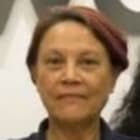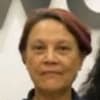commentary Commentary
Commentary: Goodbye to those days, when women were 'pieces of meat for men to slice'
Parliament’s passing of the Women’s Charter in 1961 was groundbreaking but the women’s movement has since stalled – until the recent announcement by Home Affairs and Law Minister K Shanmugam, says AWARE president Margaret Thomas.
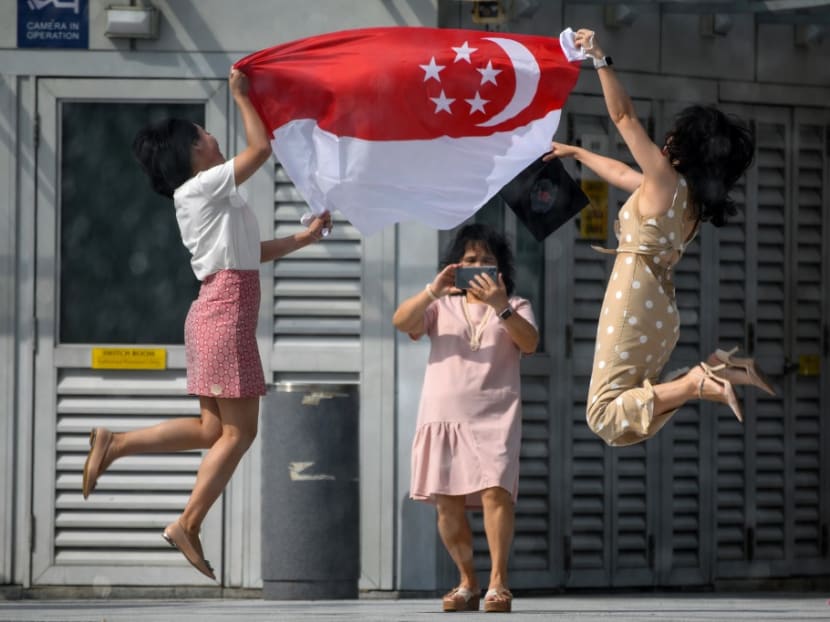
Women holding the Singapore national flag pose for a photograph at the Merlion Park to mark the 55th National Day celebrations in Singapore on Aug 9, 2020. (Photo: AFP/Rosland Rahman)
SINGAPORE: Women in our society are like pieces of meat put on the table for men to slice, declared Chan Choy Siong in a fiery speech in the Legislative Assembly in April 1960.
Choy Siong, the People's Action Party (PAP) Member for Delta and a passionate champion of women’s rights, was speaking in support of the Women’s Charter Bill.
She said it would bring about “a revolutionary change in society” as men would no longer be able to “take women as pieces of merchandise”.
The bill, which became law in 1961, was indeed remarkably progressive for the times. It gave women and men equal standing in marriage and banned polygamy for non-Muslims.
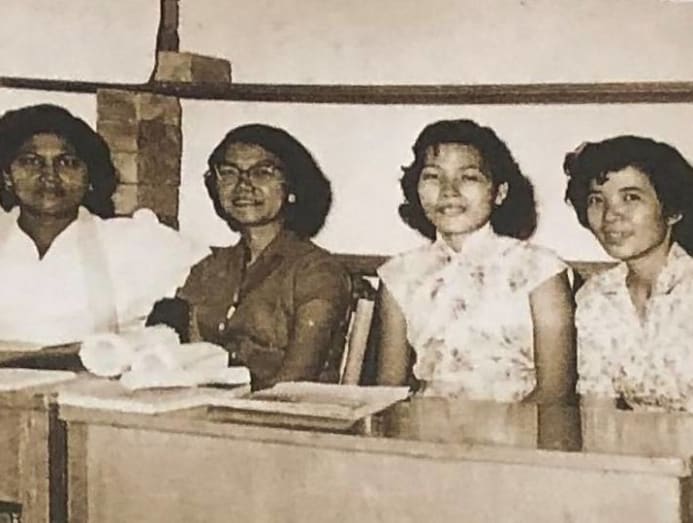
FIGHTING AGAINST POLYGAMY AND MUCH MORE IN 1950S
This ban on polygamy was what another pioneering feminist, Shirin Fozdar, campaigned for relentlessly during the 1950s.
Shirin, who began making speeches about women’s rights when she was a schoolgirl in India, came to Singapore in 1950 with her husband to spread the Baha’i faith. She soon discovered that many of the men she and her husband met at social events were there not with, as she had presumed, their one and only wife, but with their second, third or fourth wife.
Horrified that polygamy was so rife and that women and children had so little legal protection, Shirin got together some of the leading women in Singapore and formed the Singapore Council of Women (SCW).
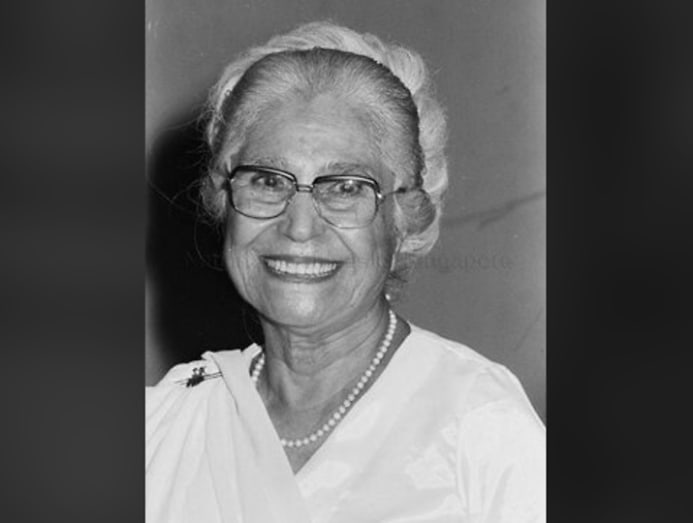
Shirin and the SCW wrote letters, gave talks, and met with political and community leaders throughout the 1950s.
Following the 1955 Legislative Assembly general election, which was Singapore’s first political election and which saw David Marshall of the Labour Front becoming the Chief Minister, Shirin wrote an open and angry letter to Mr Marshall.
“Before the elections, the Labour Front and the PAP promised to work for the uplift of the underdog and see that justice and equality prevailed. The women in this country were praying for the election of courageous and just men, who would remove the inequalities between the sexes in this country,” she said.
But “political rivalry and immature statesmanship have plunged this country into turmoil and unrest,” Shirin said.
“How much better it would be if instead of making the Legislative Assembly an arena for politicians to indulge in verbal bouts, the elected representatives would unite together on this one important issue of removing the injustices done to women. This would be repaying to some extent the debt of gratitude that you each owe to your mother, who happened to be a woman.”
The SCW’s open letter had, however, little effect on the politicians. It was only during the campaigning for the 1959 General Election that women’s rights made an appearance, and the issue was only raised by the PAP.
Voting had become compulsory in 1959, and with women forming half of the electorate, the PAP, then an opposition party, went all out to secure the female vote.
Its The Tasks Ahead manifesto spoke of monogamous marriage laws, jobs for women, equal pay for equal work, care of widows and orphans, and of encouraging women to be active in politics.
Chan Choy Siong and others from the PAP’s Women’s League spoke rousingly at PAP rallies about how women needed to be freed from being the playthings of men.
Even Kwa Geok Choo, the wife of PAP leader Lee Kuan Yew, joined the fray.
In her first and only political speech, Mrs Lee argued the case for equal pay for equal work, saying: “Our society is still built on the assumption that women are the social, political and economic inferiors of men. This myth has been made the excuse for the exploitation of female labour.”
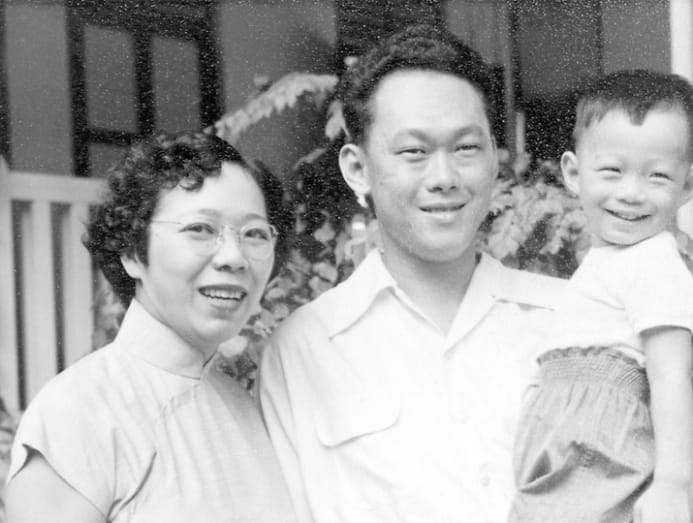
Having convincingly won the 1959 election, the PAP government set out to deliver on its promise to the women of Singapore and in 1960 it tabled the Women’s Charter Bill.
At the final reading of the Bill in Parliament in March 1961, Choy Siong declared that the law would “give the women's movement a very flat and level road on which to travel”.
THEN THE WOMEN’S MOVEMENT DISAPPEARED FOR A LONG TIME
The Women’s Charter indeed was a “landmark legislation”, as Law and Home Affairs Minister K Shanmugam noted in his recent speech about women and gender equality – a speech that is itself likely to become another landmark in the women’s movement here.
READ: Review on women's issues goes beyond the law, aims to 'deeply ingrain' gender equality in society: Shanmugam
But the road for women has not been quite as flat and level as Choy Siong anticipated and as the rest of us would have liked.
The lively women’s movement of the 1950s all but disappeared in the 1960s. With the Women’s Charter in place and polygamy banned, the SCW had little else to campaign for.
Shirin moved in 1961 to Thailand to work with destitute women and girls. Without her galvanising presence, SCW’s membership dwindled and it was dissolved in 1971.
Meanwhile, the PAP’s interest in getting more women into politics also seemed to dwindle. Most of its women MPs left when the Barisan Socialis faction split from the party, leaving just Choy Siong in Parliament.
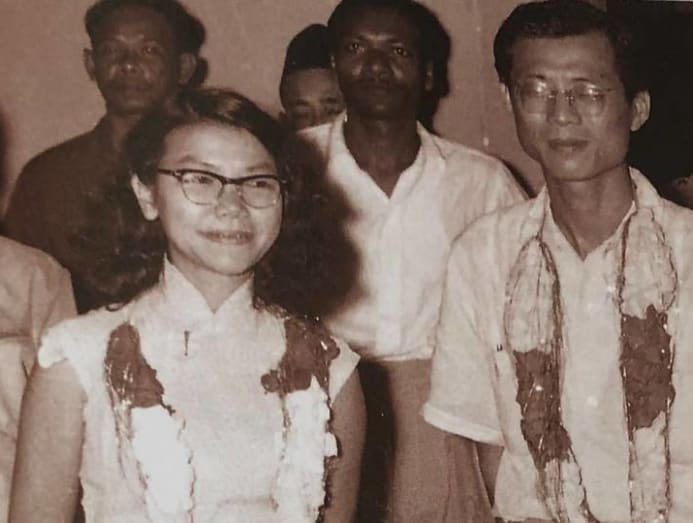
When Choy Siong retired from politics in 1970, the House became an all-male affair. It would remain without the benefit of women’s views and voices for 14 years, until the general elections of 1984. The opposition parties did have some women candidates, but none got elected.
When in 1979 the Government announced a quota on the number of women admitted to medical school, there was no woman in Parliament to argue against this blatantly discriminatory move.
There was no woman in the nation’s highest policy-making body to take issue with statements like that of Health Minister Toh Chin Chye who said it was difficult for a woman to be a good doctor because “she had to be a wife and a mother besides performing night duty in government hospitals”.
The quota, which meant women could only make up a third of each intake of medical students, would remain in place until 2003. It was one of several discriminatory laws and policies that AWARE campaigned against for many years, and which were only rectified about 15 years ago.
READ: Commentary: How do we raise sons who will never hit women?
READ: Commentary: Here’s what women really want regarding gender equality
A "PROPER ROLE"
The problem was that while the Women’s Charter was, at that time, a progressive law in making women and men equals in a marriage, it was not legislation that established gender equality as a fundamental value for Singapore.
Polygamy was banished, but patriarchy persisted.
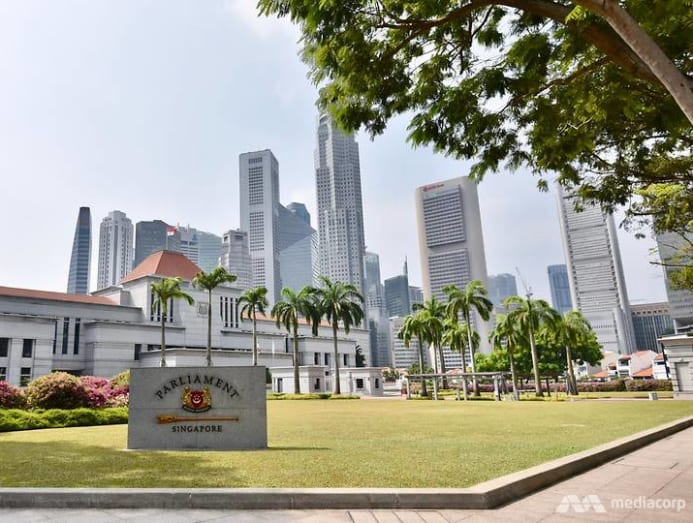
It was evident in the all-male Parliament we had for 14 years, and in sexist statements such as “girls should be girls” that emerged in the wake of Prime Minister Lee Kuan Yew’s controversial 1983 National Day Rally speech.
The late Mr Lee’s remarks sparked what became known as the Great Marriage Debate that led to a slew of sexist, elitist, and eugenicist comments and schemes designed to get graduate women to marry and have lots of children.
Shortly after this speech, Minister of State for Education Tay Eng Soon called for girls’ schools to cater to “feminine” interests and activities so that the girls would grow up better prepared for their ‘natural and proper role in life’ as wives and mothers.
READ: Commentary: What’s wrong with being a single woman?
READ: Commentary: Burden of caring for ageing parents weighs heaviest on unmarried daughters
The following year, it became compulsory for lower secondary girls to do home economics, which meant they would not be able to opt for technical studies.
Educational and other policies have flip-flopped over the years, sometimes seriously affecting the options open to women (and men).
While we have adopted as fundamental values – which are enshrined in our Constitution - non-discrimination on “the grounds of religion, race, descent or place of birth”, we have made no commitment to the principle of gender equality.
GENDER EQUALITY AS A FUNDAMENTAL VALUE
AWARE was set up 35 years ago because of this.
We believe gender equality should be a fundamental value. We consider it vitally important to remove the gender-based barriers that can and do limit the ability of people to explore and develop their full potential.
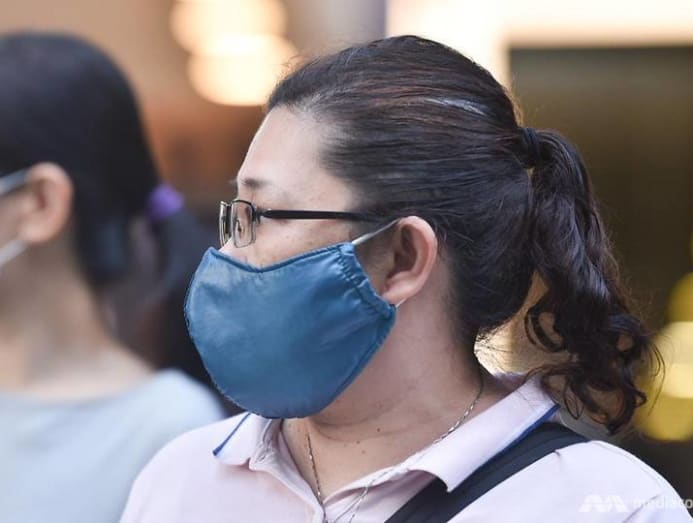
We have been able to contribute to the removal of some of these barriers, but the goal of a national commitment to the principle of gender equality has proved elusive.
It was thus astonishing to hear, on a Sunday (Sep 20) morning in September, Mr Shanmugam argue a passionate case for precisely this. Astonishing but encouraging and energising.
Sixty years ago, Singapore took a step ahead of many countries, including those much more developed than us, when the Women’s Charter became law. Singapore today is among the most developed countries in the world.
We take pride in appearing at or near the top in all manner of global rankings and indexes. It is time to take pride in being a leader in gender equality.
Margaret Thomas is President of AWARE and a former journalist.


